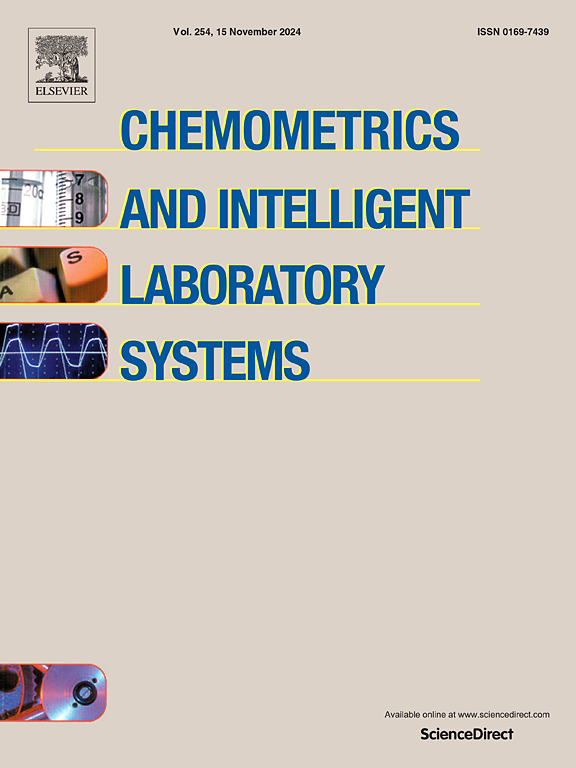基于独立分量回归深度残差建模的光谱数据校准
IF 3.7
2区 化学
Q2 AUTOMATION & CONTROL SYSTEMS
Chemometrics and Intelligent Laboratory Systems
Pub Date : 2024-11-05
DOI:10.1016/j.chemolab.2024.105270
引用次数: 0
摘要
独立分量回归(ICR)因其在非高斯数据建模和高阶统计特征提取方面的优势,近来在光谱数据校准领域颇受欢迎。受深度学习思想的启发,本文通过引入分层残差学习策略,将基本的 ICR 模型扩展为深度形式。基于深度学习模型最后一层产生的残差信息,可以逐层提取出更多不同的独立成分模式。然后,进一步采取信息压缩步骤,将从深度模型不同层获得的独立成分进行组合和压缩。在此基础上,逐层成分提取和进一步信息压缩的有效性得到了很好的证实。本文章由计算机程序翻译,如有差异,请以英文原文为准。
Spectra data calibration based on deep residual modeling of independent component regression
Independent component regression (ICR) has recently become quite popular in spectra data calibration, due to its advantages in non-Gaussian data modeling and high-order statistics feature extraction. Inspired by the idea of deep learning, this paper extends the basic ICR model to the deep form by introducing a layer-wise residual learning strategy. Based on the residual information generated from last layer of the deep learning model, more and more different patterns of independent components can be extracted layer-by-layer. Then, a further information compression step is taken to combine and also to condense those independent components obtained from different layers of the deep model. Two detailed benchmark case studies are implemented to evaluate the calibration performance of the develop model, based on which the effectiveness of both layer-by-layer component extraction and further information compression are well confirmed.
求助全文
通过发布文献求助,成功后即可免费获取论文全文。
去求助
来源期刊
CiteScore
7.50
自引率
7.70%
发文量
169
审稿时长
3.4 months
期刊介绍:
Chemometrics and Intelligent Laboratory Systems publishes original research papers, short communications, reviews, tutorials and Original Software Publications reporting on development of novel statistical, mathematical, or computer techniques in Chemistry and related disciplines.
Chemometrics is the chemical discipline that uses mathematical and statistical methods to design or select optimal procedures and experiments, and to provide maximum chemical information by analysing chemical data.
The journal deals with the following topics:
1) Development of new statistical, mathematical and chemometrical methods for Chemistry and related fields (Environmental Chemistry, Biochemistry, Toxicology, System Biology, -Omics, etc.)
2) Novel applications of chemometrics to all branches of Chemistry and related fields (typical domains of interest are: process data analysis, experimental design, data mining, signal processing, supervised modelling, decision making, robust statistics, mixture analysis, multivariate calibration etc.) Routine applications of established chemometrical techniques will not be considered.
3) Development of new software that provides novel tools or truly advances the use of chemometrical methods.
4) Well characterized data sets to test performance for the new methods and software.
The journal complies with International Committee of Medical Journal Editors'' Uniform requirements for manuscripts.

 求助内容:
求助内容: 应助结果提醒方式:
应助结果提醒方式:


